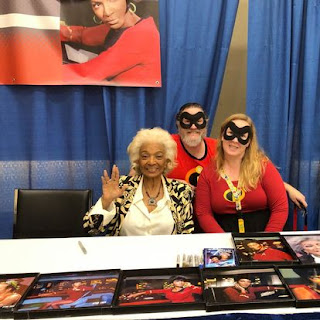Scott asks if you have any phrases in Klingon you’d like to share. What are the most important phrases to know in another language? How does learning another language provide insight into learning a new culture?
I don't know Klingon yet (beyond Qapla'), but I will soon. More on that in the next unit. I think the most important phrases to know in any culture are basic courtesy: greetings/farewells; who am I/who are you; daily niceties; being able to inquire politely and acknowledge responses in like manner; and any questions/replies related to health, help, and safety. These set a foundation, but knowledge of a culture is important in language study, and vice versa. I have two favorite examples of this. This first one, of course, is the "Darmok" episodes of The Next Generation. I love that what the crew of the Enterprise is slowly figuring out using historical and literary databases, Captain Picard is also figuring out by interacting with and getting to know his Tamarian counterpart; he sets aside fear, uses observation, and establishes mutual trust. His openness helps him decode the kinds of stories that have value to the Tamarians, and which form the foundation of their analogy-based language. He gets to know them as a people through their language, and his interaction with the Tamarians at the end (and his Tamarian farewell gesture in honor of his new and fallen friend), show how much he has learned in a short time.
The other example of how linguistics relate to culture is the entire movie The Arrival (non-Trek example but definitely involving aliens). Three exchanges of note (copied from IMDB because I can't remember them verbatim):
Ian Donnelly : If you immerse yourself into a foreign language, then you can actually rewire your brain.
Louise Banks : Yeah, the Sapir-Whorf hypothesis. It's the theory that the language you speak determines how you think and...
Ian Donnelly : Yeah, it affects how you see everything.
Colonel Weber : Mornin'.
Louise Banks : Colonel.
Colonel Weber : [answering a previous question about the Sanskrit word for war and it's meaning] Gravisti. He says it means an argument. What do you say it means?
Louise Banks : A desire for more cows.
Louise Banks : Let's say that I taught them Chess instead of English. Every conversation would be a game. Every idea expressed through opposition, victory, defeat. You see the problem? If all I ever gave you was a hammer...
Colonel Weber : Everything's a nail.
“What episode of Star Trek makes you step back and rethink your stance on gender, race, or sexuality? Why is that?”
Well, I'm not sure any of them have made me rethink my stance on any of these things, because I'm basically the choir to whom Star Trek is preaching. But there have been times when I've been happily moved by the stories the show has chosen to tell. I loved hearing Terry Farrell's thoughts on being able to portray a same-sex relationship when her character Jadzia Dax is attracted to the widow of one of her symbiont's former hosts. There's an on-screen same-sex kiss which, despite the notion that the Jadzia character is actually "male" in the scene, representing Curzon Dax, was unusual on TV at that time. Terry Farrell's sharing that fans reached out to her after the episode with gratitude and support is testament to episode's value. And I'd argue that it was that episode that put Trek on its current path of inclusion and representation; we now have same-sex couples in all currently-airing Star Trek series, as well as transgender and non-binary characters.




Comments
Post a Comment